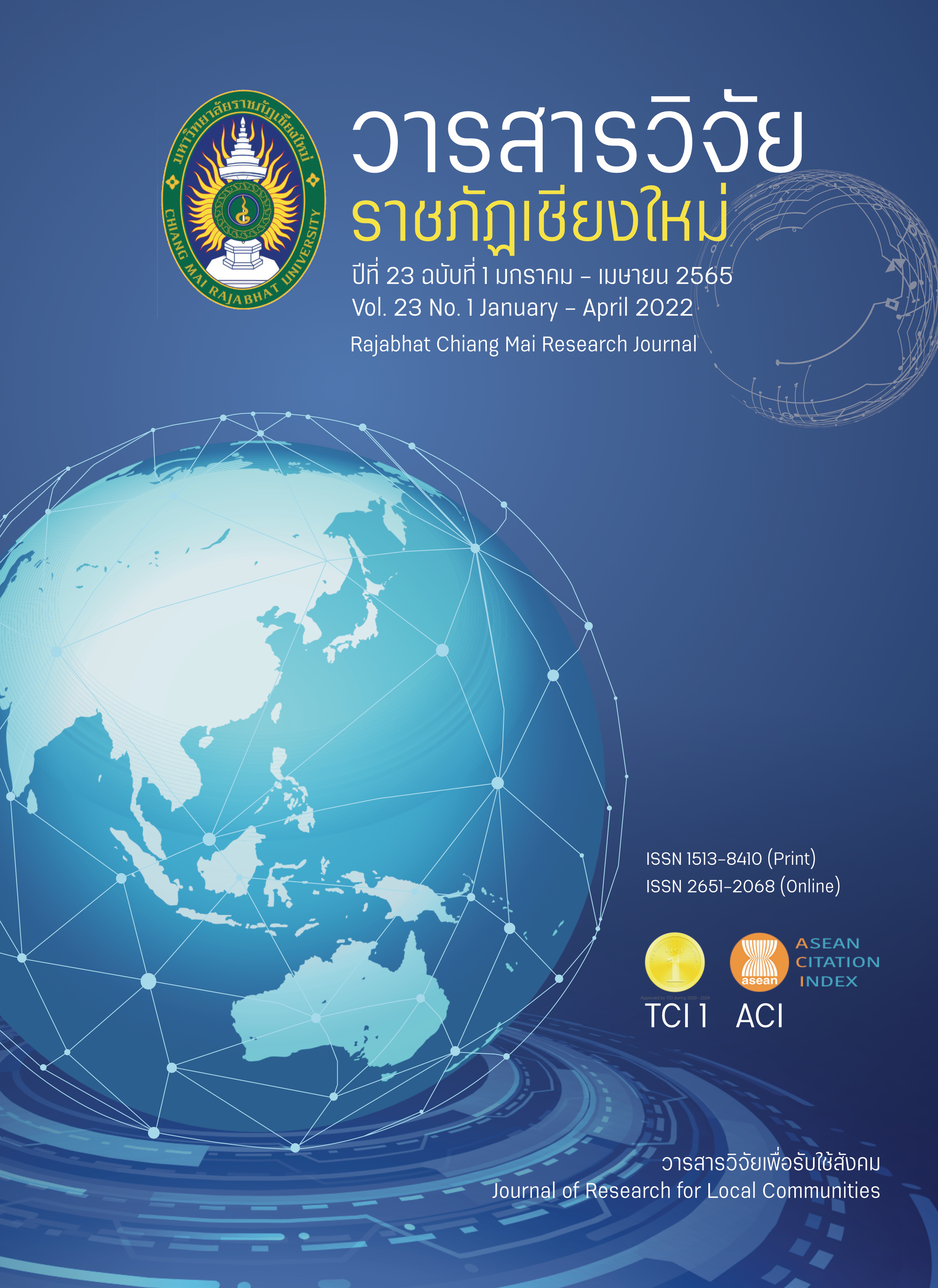การขับเคลื่อนหลักปรัชญาของเศรษฐกิจพอเพียงสู่การบริหารสถานศึกษาขั้นพื้นฐาน ในเขตพื้นที่การศึกษาประถมศึกษาเชียงใหม่ เขต 3 จังหวัดเชียงใหม่
-
DOI:
https://doi.org/10.14456/rcmrj.2022.245497คำสำคัญ:
การขับเคลื่อนปรัชญาของเศรษฐกิจพอเพียงบทคัดย่อ
วัตถุประสงค์ของการวิจัยเชิงปฏิบัติการ 1) เพื่อขับเคลื่อนหลักปรัชญาของเศรษฐกิจพอเพียงสู่การบริหารสถานศึกษาขั้นพื้นฐาน 2) เพื่อศึกษาผลการขับเคลื่อนหลักปรัชญาของเศรษฐกิจพอเพียงสู่การบริหารสถานศึกษาขั้นพื้นฐานและ 3) เพื่อจัดทำข้อเสนอเชิงนโยบายในการขับเคลื่อนหลักปรัชญาของเศรษฐกิจพอเพียงสู่การบริหารสถานศึกษาขั้นพื้นฐานในเขตพื้นการศึกษาประถมศึกษา เขต 3 จังหวัดเชียงใหม่ ดำเนินการวิจัยร่วมกับกลุ่มเป้าหมาย จำนวน 141 คน เครื่องมือที่ใช้ในการวิจัยได้แก่ แบบวิเคราะห์เอกสาร แนวทางการระดมสมอง แบบสังเกต และแบบประเมินผลการปฏิบัติงาน วิเคราะห์ข้อมูลเชิงปริมาณโดยใช้ค่าร้อยละ ค่าเฉลี่ย ค่าเบี่ยงเบนมาตรฐาน และข้อมูลเชิงคุณภาพใช้การวิเคราะห์เชิงเนื้อหาและเขียนบรรยายเชิงพรรณนา ผลการวิจัยสรุปได้ดังนี้
การขับเคลื่อนหลักปรัชญาของเศรษฐกิจพอเพียงสู่การบริหารสถานศึกษาขั้นพื้นฐานในเขตพื้นที่การศึกษาประถมศึกษาเชียงใหม่ เขต 3 ได้ดำเนินการใน 4 ขั้นตอนได้แก่ การวางแผน การปฏิบัติ การสังเกต และการสะท้อนผล และดำเนินการ 10 กิจกรรมดังนี้ 1) วิเคราะห์เอกสารและการระดมสมอง 2) วางแผนการขับเคลื่อนหลักปรัชญาของเศรษฐกิจพอเพียง 3)ประชุมเชิงปฏิบัติการทบทวนแผนปฏิบัติการประจำปี 4) ประชุมเชิงปฏิบัติการจัดทำโครงการพัฒนาผู้เรียน 5) อบรมเชิงปฏิบัติการออกแบบหน่วยการเรียนรู้และจัดทำแผนการจัดการเรียนรู้ 6) นิเทศติดตามผลการออกแบบหน่วยการเรียนรู้ 7) หาคุณภาพของหน่วยจัดการเรียนรู้ แผนการจัดการเรียนรู้ 8) จัดกิจกรรมการเรียนรู้ที่บูรณาการหลักปรัชญาของเศรษฐกิจพอเพียง 9) นิเทศติดตามการขับเคลื่อนหลักปรัชญาของเศรษฐกิจพอเพียง 10) ประชุมเชิงปฏิบัติการเพื่อสะท้อนผลการดำเนินงาน
ผลการขับเคลื่อนในภาพรวมพบว่าปฏิบัติงานอยู่ในระดับคุณภาพมาก ทุกด้านมีการปฏิบัติงานอยู่ในระดับมาก ด้านที่มีค่าเฉลี่ยสูงสุดได้แก่ ด้านการบริหารจัดการสถานศึกษา รองลงมาคือด้านผลลัพธ์/ภาพความสำเร็จ และด้านหลักสูตรและการจัดกิจกรรมการเรียนรู้ ด้านที่มีค่าเฉลี่ยต่ำสุดได้แก่การจัดกิจกรรมพัฒนาผู้เรียน และสถานศึกษาที่มีผลการพัฒนาเชิงประจักษ์ได้แก่ 1) โรงเรียนบ้านวังจ้อมได้ผ่านการประเมินให้เป็นศูนย์การเรียนรู้เศรษฐกิจพอเพียง 2) โรงเรียนบ้านปางมะเยา มีผลงานวิจัยรองรับ 2 เรื่องคือ แนวทางการบริหารงานวิชาการตามหลักปรัชญาของเศรษฐกิจพอเพียง และการบริหารจัดการแหล่งเรียนรู้กลุ่มชาติพันธุ์ และทุกโรงเรียนมีแผนการขับเคลื่อนหลักปรัชญาของเศรษฐกิจพอเพียงอย่างต่อเนื่อง
ข้อเสนอเชิงนโยบายในการขับเคลื่อนหลักปรัชญาของเศรษฐกิจพอเพียงสู่การบริหารสถานศึกษาขั้นพื้นฐานในเขตพื้นการศึกษาประถมศึกษาเชียงใหม่ เขต 3 นำเสนอด้านการพัฒนาผู้เรียน การพัฒนาหลักสูตร การจัดการเรียนการสอน การจัดสภาพบรรยากาศและสภาพแวดล้อม การบริหารจัดการสถานศึกษา การให้ผู้ปกครองเข้ามามีส่วนร่วม และการติดตามประเมินผลการจัดการศึกษา
Downloads
เอกสารอ้างอิง
Basic Education Committee, Office of the Basic Education Commission. (2017). Basic school administration guide. Bangkok: Religious Printing Factory. (in Thai)
Ministry of Education. Educational institution. (2009). Model for teaching and learning process management and management according to Philosophy of sufficiency economy "Sufficiency Education Institute 2009". Ministry of Education Announcement. (in Thai)
Muenjaem, S. (2019). Driving the Philosophy of the Sufficiency Economy to Basic School in Ban Wangoom Community School Chiiangao Dao District Chiang Mai Province. Rajabhat Chiang Mai Research Journal, 20(1), 57-69. (in Thai)
Office of Policy and Strategy. (2007). Driving sufficiency economy philosophy to educational institutions, Office of Permanent Secretary: Ministry of Education. Bangkok. (in Thai)
Tantivejkul, S. (2007). Life in sufficiency economy according to the royal initiative. Matichon, Bangkok. (in Thai)
Dharmapiya, P. (2015). Sufficiency Economy Philosophy and Education Management. Project to Support the Sufficient Economy. The Crown Property Bureau, Bangkok. (in Thai)
Hajaturat, S. (2018). Driving The Philosophy of Sufficiency Economy into Basic Education Ban Mae O Nai School, Chiang Dao District, Chiang Mai Province. Rajabhat Chiang Mai Research Journal, 19(2), 63-73. (in Thai)
Thamthasananon, S. (2017). School Based Management for Local Development of School in Maha Sarakham Provincial Administrative Organization. Buabundit Journal of Educational Administration (Buajead), 17(3), 41-52. (in Thai)
Wichaakkharawit, C. (2012). Model of Basic School Administration Based on the Philosophy of Sufficiency Economy. Rajabhat Chiang Mai Research Journal, 13(2), 71-88. (in Thai)
Wichaakkharawit, C. (2017). Model of learning Management based on the Philosophy of Sufficiency Economy In Schools for Basic Education in Chiang Mai province. Buabundit Journal of Educational Administration (Buajead), 17(2), 167-176. (in Thai)
ดาวน์โหลด
เผยแพร่แล้ว
รูปแบบการอ้างอิง
ฉบับ
ประเภทบทความ
สัญญาอนุญาต
ลิขสิทธิ์ (c) 2022 วารสารวิจัยราชภัฏเชียงใหม่

อนุญาตภายใต้เงื่อนไข Creative Commons Attribution-NonCommercial-NoDerivatives 4.0 International License.
1. บทความ ข้อมูล เนื้อหา รูปภาพ ฯลฯ ที่ได้รับการตีพิมพ์ใน “Community and Social Development Journal” ถือเป็นลิขสิทธิ์ของ Community and Social Development Journal มหาวิทยาลัยราชภัฏเชียงใหม่ และเพื่อให้เผยแพร่บทความได้อย่างเหมาะสมผ่านสื่อสิ่งพิมพ์และอิเล็กทรอนิกส์ ผู้เขียนยังคงถือครองลิขสิทธิ์บทความที่ตีพิมพ์ภายใต้ใบอนุญาต Creative Commons Attribution (CC BY) ซึ่งอนุญาตให้เผยแพร่บทความซ้ำในแหล่งอื่นได้ โดยอ้างอิงต้องอ้งอิงบทความในวารสาร ผู้เขียนต้องรับผิดชอบในการขออนุญาตผลิตซ้ำเนื้อหาที่มีลิขสิทธิ์จากแหล่งอื่น
2. เนื้อหาบทความที่ปรากฏในวารสารเป็นความรับผิดชอบของผู้เขียนบทความโดยตรง ซึ่งกองบรรณาธิการวารสารไม่จำเป็นต้องเห็นด้วยหรือร่วมรับผิดชอบใดๆ














